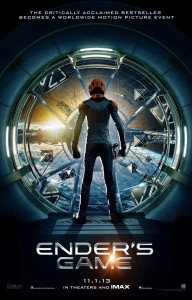“Ender’s Game” is a nifty sci-fi movie that is more serious-minded and morally complex than most other big budget movies out there. Based on an award-winning and highly touted sci-novel of the same name, this is a story that tackles some pretty big issues, and while it doesn’t get so deep into these things that the movie comes across as a lecture or preachy, at least it feels comfortable enough to even bring these ideas up, daring the audience to actually think about the parallels between this sci-fi world and our real world. Plus there is some cool space stuff, so that helps.
In “Ender’s Game,” our protagonist is 12-year Ender Wiggin (Asa Butterfield), who has been chosen to be groomed to be the next great commander of Earth’s international space fleet, which was formed after an alien invasion years prior nearly wiped out all of humanity. Since the invasion, everyone on Earth banded together to put together a military force that could repel future attacks, and in an effort to find the best leaders possible, children were regularly drafted into the military and put through different camps and schools in order to find the absolute best of the best. Of course, as indicated with the title of this story, Ender is one of these chosen few, fortunate enough to be considered a candidate to be a great leader, and unfortunate enough to have the weight of mankind’s possible extinction placed squarely on his shoulders.
So Ender gets recruited, goes through boot camps and schools, and we get to see how the higher ups like Colonel Graff (Harrison Ford) and Major Anderson (Viola Davis) poke and prod Ender and put him in situations to test him out and see if he’s the person they are looking for (obvious spoiler alert: of course he’s the guy, the whole story is named after him!). Eventually he gets to a point in which he has hand picked his own squad and they are going through intense training in anticipation of an imminent war with the horrible aliens that almost killed them all once before, and a good chunk of the story and movie are dedicated to Ender’s development and advancement through the ranks. But then the last fifteen to twenty minutes of the story takes a big turn, one that is pretty exciting and interesting emotionally and story wise, but which also renders the actual ending kind of anti-climactic.
Okay, REAL SPOILERS for this one paragraph. If you do not know what happens in this story and want to remain unsullied, skip the next spoiler-free paragraph. Okay, seriously, here we go, spoiler time: so Ender and his friends are tricked by their superior officers, as they are told they are running a final battle simulation when in reality they were fighting a real battle. So when Ender sacrifices thousands of people to win the battle, which he does by destroying the entire alien planet and committing mass genocide, he thinks he was just beating the simulation, a program whipped up by his own people. But then he is told that the battle was real, and he is called a hero and a savior, but the only things Ender can grasp are the facts that he was lied to and manipulated by his superiors, and the idea that he will likely be remembered as a mass murderer. First off, this is some HEAVY stuff for a movie about 12-year olds, and it brings up some great moral dilemmas, like using the youth to fight wars with such intense moral and psychic consequences and then expecting them to live the rest of their lives as if everything is perfectly fine. And then there is the debate about the greater good, and whether or not these kind of actions are justifiable, especially when it comes down to destroying one group of people (or aliens) in order to save another. But then the problem with this revelation is that the story needs to continue after this moment, and this huge space battle is set up like a climax, the whole movie built up to this moment, and then with it over, there is just emotional despair from Ender, which leads to him finding a single unhatched alien egg and then setting out to find a good place to leave the egg so the aliens can repopulate a new planet. The story ends with Ender trying to right his wrongs, and while it is an interesting and compelling ending, especially in written form, it is very anticlimactic after the space battles and big action and whatnot. Is this a bad thing? Not necessarily. But it could leave some people feeling like the movie just peters out a bit at the end, leaving certain things unfulfilled, which can be seen as purposefully ending this movie to set up movie sequels.
Okay, the spoilery paragraph was longer than expected, but there will be no more of those for the rest of the way.
“Ender’s Game,” while surprising me in how engaged I felt with the story and characters, is obviously not a perfect film. There is this one aspect of the story in which Ender is constantly referred to as “a third,” meaning he was a third child born to a family that already had two kids, and apparently there is some sort of two-child policy in this world, which does not make any sense because if aliens almost wiped out all of humanity, that means the human population would be depleted, meaning we would need as many babies as possible to keep this whole humanity thing trucking along. So why LIMIT the amount of kids people could have? And then what makes being a “third” so special? There really is nothing tied to this whole “third” thing other than being a way for other kids to make fun of Ender. It feels like a weird detail that did not translate properly from book to screen.
There are also a number of scenes in the movie in which characters just discuss philosophy and psychoanalyze Ender and the other recruits and a lot of this stuff feels kind of ham fisted, as if they felt they had to squeeze this stuff into the movie but without really spending too much time developing these ideas. For example, halfway through the movie there is lip service paid to the idea of post traumatic stress disorder and how governments are fine with sending soldiers out to war without any regard for how many of them will come back from said war irreparably broken. It’s a good thought to bring up this dilemma with war and our participation in such horrible endeavors, but like the whole “third” thing, it goes nowhere.
Basically this is a simplified movie version of a morally dynamic story, and though it is simplified, it still asks some of the same questions and brings up the same conundrums that can easily turn into moral quicksand. It could have been REALLY dumbed down and simplified but it wasn’t, and that made for a rather compelling movie which deserves to be seen by people looking for more than just a basic space adventure.
P.S. To hear what I thought about the proposed boycott of this movie due to the horribly bigoted viewpoints of the original novel’s author Orson Scott Card, please listen to episode 43 of Cinema Crespodiso.


 Spillover Bonus Episode – What’s New, Pussycat?
Spillover Bonus Episode – What’s New, Pussycat? Dr. Drew’s Two Cents – Food
Dr. Drew’s Two Cents – Food #582 – Blasphemous Satanic Feminist
#582 – Blasphemous Satanic Feminist BONUS EPISODE – Florida Film Festival 2014
BONUS EPISODE – Florida Film Festival 2014
Leave a Reply
You must be logged in to post a comment.